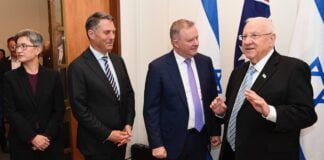The palace coup that installed Julia Gillard as prime minister triggered a flurry of discussion about Labor’s factional heavy-weights pulling the strings. The irony was that right-wing power brokers had made the move to place Gillard, a member of the left faction, in the top job.
Just as ironically, it had been the left that was crucial to installing Rudd.
It is of course unusual for anyone from Labor’s left to be federal leader. But it has been a long time since Gillard’s membership of the left meant anything in political terms.
Gillard was never a radical. Some on the lunatic right have tried to spread hysteria about her former membership of the Socialist Forum.
But Socialist Forum was not that left-wing—in the 1980s it pushed to expel a grouping of unions from Victoria’s Left faction on the basis that they opposed privatisation and parts of the Hawke and Keating government’s neo-liberal reform program.
Despite her background on the Labor left, Gillard has a history of collaborating with the right in order to win positions of influence in the party.
Pursuing the right’s agenda
Labor’s Socialist Left faction, particularly in Victoria where Gillard became involved, originally had a clear ideological left-wing stance. Not so any longer. Gillard was one of the key players in pushing a “modernising” agenda of reduced government spending, along with labour and financial deregulation. As one of the most aggressive in demanding the left dump its opposition to the party’s right-wing policies, she never held the trust of many of the faction’s members. According to Jacqueline Kent, author of her biography, The Making of Julia Gillard, there was a view that she was a careerist, and too ready to make deals.
After two failed efforts to nominate for a federal seat, Gillard only managed to get pre-selection by defeating the approved Socialist Left candidate—taking votes from the right-wing Labor Unity faction and supporters of Martin Ferguson, who had formed his own “independent” left faction. Not for the last time, she would ally with the right against the left.
In parliament, Gillard held a number of shadow ministerial positions while Labor was in opposition. She became shadow immigration minister after Labor’s defeat in the “Tampa election” of 2001. Labor’s capitulation to John Howard’s “tough” anti-refugee policies—supporting every single bit of anti-refugee legislation in the run up to the election—allowed the racist myths about refugees to win wider acceptance. Many Labor members tore up their party cards in disgust.
In 2002, Labor for Refugees was formed, the most significant movement inside the party campaigning to change Labor policy for many years. But foreshadowing her recent efforts to pander to the right as PM, Gillard took sides with the right of the party to push through an “electable” policy.
Rather than support Labor For Refugees and the efforts of the refugee campaign to shift public opinion, she wanted the party to continue to go along with Howard’s racism.
At the 2004 Labor conference, Gillard was one of three left shadow ministers to break with the left and vote against the Labor for Refugees motion. She justified this by saying, “We’re here to get Labor elected. I never drafted policy to be the policy of a loser. I drafted it to win.”
Gillard has consistently seen “getting elected” as the first priority. Even in her early days in the Socialist Forum, she claimed, “the only possibility for major social change is under a long period of Labor administration”. Yet her progress through the ranks of the Labor Party has shown that, to pursue the aim of getting power, she is quite willing to abandon any commitment to serious social change. In the refugee debate, Gillard has succumbed to opportunism in the quest for power, rather than sticking to political principles.
Gillard’s support for Third Way politics took her from serious support for Mark Latham to serious support for Kevin Rudd. Third way politics rejects the idea of government actively addressing social inequality. Instead all it claims that can be done is for individuals to become upwardly mobile by climbing the “ladder of opportunity”, to use Latham’s phrase.
In her first speech as Prime Minister, Gillard made a point of paying her respects to the governments of Hawke, Keating and John Howard. Her capitulation to the mining bosses, to Abbott’s anti-refugee policies, and her determination to do nothing about climate change without a national consensus (read “something the major polluters will be happy with”), and her commitment to reliable economic management tells us that Gillard intends dragging Labor further to the right.
For refugee and union rights, for action on climate change, for justice for Aboriginal people, we will need to fight her every inch of the way.
By James Supple





